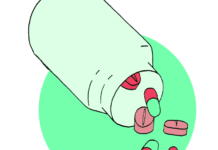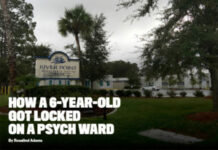So They Say Your Child has ADHD? April Fools!
My new book, Debunking ADHD: 10 Reasons to Stop Drugging Kids for Acting Like Kids, is scheduled to be released tomorrow, on April 1st. Really, no joke. To be honest, when my editor informed me of this unique release date, it didn't strike me as the most complimentary day to publish research that has been years in the making and is ultimately a very serious subject. As time passed and the big day has slowly approached, however, the release date has come to feel completely serendipitous! April Fool's Day is indeed the perfect day to re-energize a powerful movement to put an end to the drugging of kids for acting like kids. Like an unkind April Fool's Day prank, ADHD is a complete joke.
Prescription Stimulant Use is Associated with Earlier Onset of Psychosis
Individuals diagnosed with psychotic disorders have an earlier onset of psychosis if they have previously been exposed to prescription stimulants, according to new research currently in press in the Journal of Psychiatric Research.
Shire Pharmaceuticals & the MEP – A Case Study in Manipulation?
My last blog raised issues about the involvement of Shire Pharmaceuticals in lobbying for the inclusion of mandatory screening of children for ADHD in...
The Issue of Over-Diagnosing in Psychiatry
From The Concordian: On October 30th, Dr. Joel Paris, a professor of psychiatry at McGill University, gave a lecture about the dangers and consequences of...
Omega-3 Screening for Psychiatric Symptoms?
There is a substantial body of evidence suggesting that not getting enough omega-3 fatty acids in your diet may be connected to a diverse array of psychiatric symptoms. In a new study published this month, psychiatrist Robert McNamara and Erik Messamore provide an overview of the evidence and call for screening of omega-3 deficiency in people experiencing symptoms associated with ADHD, depression, mood disorders, and psychosis.
ADHD More Severe in Children Exposed to Pollution and Economic Deprivation
ADHD behaviors were linked to the presence of both high levels of pollutants and persistent economic deprivation at birth and through childhood.
Critical Influence of Nutrition on Psychosocial Wellbeing in Childhood
The bidirectional relationship between diet and nutrition and social, emotional, and educational factors among European youth.
Study Finds Parents Need More Support to Identify PTSD in Children
A new study, published in The Journal of Clinical Psychiatry, investigates the presence of posttraumatic stress symptomatology in children involved in motor vehicle collisions...
6-Year-old Boy Committed to a Psych Ward
From BuzzFeed News: A six-year-old boy in Jacksonville, Florida was recently committed to a psychiatric institution for throwing a temper tantrum in school. There, he...
JAMA Review Questions Use of Ritalin for ‘ADHD’
In December, MIA reported on a systematic Cochrane review on the research for the safety and effectiveness of Ritalin (methylphenidate) that found substantial bias...
Book Review: “Overmedicated and Undertreated”
A former pharma executive has broken ranks with the industry in a new book by reporting how multiple psychiatrists, schools, and his desperate hopes pressed him to allow higher and higher doses of antipsychotic medications. The result: his 15-year-old son's death from Seroquel.
Bipolar? When Quitting is the Answer
Whether it’s the Nurtured Heart Approach, or any other method that’s truly up to the task, we need these effective strategies and ways of thinking to be more widespread so we can lessen the pitfalls of the medical model’s limited prospective which has no idea of how to turn intense into immensely great.
How to Escape Psychiatry as a Teen: Interview with a Survivor
When I lived in Massachusetts I taught yoga and led writing groups for alternative mental health communities. While the organizations I worked for were alternative, many of the students and participants were heavily drugged with psychiatric pharmaceuticals. There was one skinny teenager I'd never have forgotten who listed the drugs he was on for me once in the yoga room after class: a long list of stimulants, neuroleptics, moods stabilizers; far too many drugs and classes of drugs to remember. I was at the housewarming party of an old friend, and who should walk in but that boy who used to come to my yoga classes and writing groups religiously. And he was no longer a boy; he was now a young man. “I'm thinking yoga teacher,” he said. I nodded. Did he remember where? “I'm not stupid,” he said, as if reading my mind. “I'm not on drugs anymore. I'm not stupid anymore.”
NIMH Info for Parents on “ADHD” Misleading, Researchers Say
A new analysis of the information that the National Institute of Mental Health (NIMH) publishes for parents about attention deficit hyperactivity disorder (ADHD) concludes that the children’s experiences and contexts are ignored and that medication is presented, misleadingly, as the only solution supported by research evidence.
Advancing the Use of Safe and Effective ADHD Treatment Options
The American public has come to view ADHD drug treatment as a rather benign option for common behavioral and academic issues. A recent report by the Centers for Disease Control and Prevention indicates that 14% of American children receive a diagnosis of ADHD before the end of childhood. Rates of diagnosis and treatment vary by geographic region. In some communities rates of treatment are much higher than the national average. By most any reasonable measure, the number of children who are medicated under the guise of ADHD is out of bounds. Current levels of ADHD drug treatment are unsafe for individuals and society.
Sluggish Cognitive Tempo – A New Diagnosis?
On April 11, 2014, journalist Alan Schwarz published an article in the New York Times on this topic, titled Idea of New attention Disorder Spurs Research, and Debate. In the article Alan draws attention to the fact that sluggish cognitive tempo (SCT) is being promoted as a new disorder "… characterized by lethargy, daydreaming and slow mental processing." He makes the obviously valid point, that the formalization of such an entity "… could vastly expand the ranks of young people treated for attention problems."
Study Explores Sexual and Intimate Partner Violence in College Women with Disabilities
A new study explores sexual violence and intimate partner violence in college women with mental health related disabilities.
Spinning Straw into Gold: When Science Becomes Fiction
In Grimm’s fairy tale Rumpelstiltskin, an impish little man helps a girl spin straw into gold. This story seems an apt metaphor for how legitimate neuroscience research can become transformed into sensationalist claims regarding the causes and treatment of ADHD.
Prenatal Valproate Exposure Linked with ADHD Diagnosis in Children
Children who were exposed to anti-seizure drug valproate in utero were 48% more likely to develop ADHD, according to a new study.
Global Rise in ADHD Diagnoses: Medicine or Marketing?
The dramatic rise in ADHD spreading from the United States to the rest of the world is more an "economic and cultural plague" than...
Exploring the Role of Community Engagement in School Psychology
New research emphasizes the impact of school connectedness and community engagement interventions on students' mental health.
New Trial Finds Trauma-Focused Therapy Effective in Children
Trauma-focused cognitive behavioral therapy (Tf-CBT) is effective at reducing the symptoms associated with PTSD in children and adolescents, according to a new trial out...
Did the No Child Left Behind Act Boost ADHD Diagnosing?
The increasing use of psychiatric medications in toddlers, particularly of stimulants for ADHD, is explored by journalist Josiah Hesse on Substance.com. Looking into possible...
Digital Media Use Linked to Increase in ADHD Symptoms
Increased frequency of digital media use can increase symptoms of ADHD among adolescents, study finds.
News Flash: 4.5 Million Children Forced Daily by “Caretakers” to Do Cocaine-like Drugs
Before we get to the meat and potatoes documenting how this headline is not only shocking but also accurate, you must know that a secondary goal of this blog is to test a few theories. I have been pondering these theories because it seems to be a mystery as to why (after more than two decades of whistleblowers warning the public) so many adults have not heard or heeded the news that ADHD stimulant drugs, which are not that different from cocaine, are extremely dangerous for kids.


















